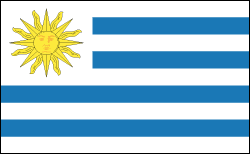- / Countries of the World
- / history
Uruguay History

Index
A Civilian Gonvernment Improves Outlook
A military coup ousted the civilian government in 1973. The military dictatorship that followed used fear and terror to demoralize the population, taking thousands of political prisoners. After ruling for 12 years, the brutal military regime permitted election of a civilian government in Nov. 1984 and relinquished rule in March 1985; full political and civil rights were then restored.
Subsequent leaders contended with high inflation and a mammoth national debt. Presidential and legislative elections in Nov. 1994 resulted in a narrow victory for the center-right Colorado Party and its presidential candidate, Julio Sanguinetti Cairolo, who had been president in 1985–1990. He pushed for constitutional and economic reforms aimed at reducing inflation and the size of the public sector, including tax increases and privatization. In Nov. 1999 Jorge Batlle, of the Colorado Party, won the presidency.
In 2002, Uruguay entered its fourth year of recession. Economic troubles in neighboring Argentina caused a staggering 90% drop in tourism. Batlle also faced a sizable budget deficit, a growing public debt, and a weakening of the peso on international markets. The country's economic outlook began improving in 2003. In a Dec. 2003 referendum, 60% of the electorate voted against opening up the state oil monopoly to foreign investment. In Oct. 2004, Tabaré Vázquez of the Socialist Broad Front won 50.7% of the vote; he took office in March 2005. It was the left’s first national victory in Uruguay.
The Supreme Court ruled in October 2009 that amnesty laws protecting members of the military dictatorship from prosecution for human rights violations under the junta, which ruled from 1973 to 1985, are unconstitutional. Days later, former military ruler Gregorio Alvarez was sentenced to 25 years in prison for the murder of 37 people and human rights violations, and in February 2010 former president Juan Maria Bordaberry was also sentenced to 30 years for murder and his role in the 1973 military coup.
In November 2009's runoff presidential election, José Mujica, a former leftist guerrilla and a member the center-left governing Broad Front, defeated the conservative National Party candidate, Luis Alberto Lacalle, 53% to 43%. Mujica said he would pursue the moderate policies implemented by Vazquez, the outgoing president.
